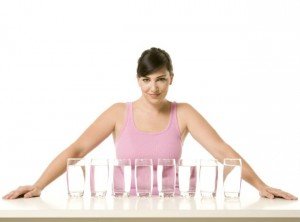How much water to drink? The legend of the 8 glasses of water a day
 Have you ever heard of the recommendation to drink at least 8 glasses of water a day? Have you ever wondered how we got to this size? Why exactly 8 glasses? The most awake can already give an answer (the one they have already given), so 8 glasses of water correspond to about one and a half liters of water a day, the minimum quantity (from one and a half to two liters) that according to many nutritionists and “people in the know” should be drunk to stay healthy and hydrate at an optimal level. Now I’ll explain how the theory of 8 glasses of water a day was born, and how no one has established with certainty an optimal quantity of water to drink for our health: yes, without paraphrasing, I’m telling you that that of 8 glasses of water a day it is a legend, and that in fact there is no optimal amount of water per capita, but only hypotheses.
Have you ever heard of the recommendation to drink at least 8 glasses of water a day? Have you ever wondered how we got to this size? Why exactly 8 glasses? The most awake can already give an answer (the one they have already given), so 8 glasses of water correspond to about one and a half liters of water a day, the minimum quantity (from one and a half to two liters) that according to many nutritionists and “people in the know” should be drunk to stay healthy and hydrate at an optimal level. Now I’ll explain how the theory of 8 glasses of water a day was born, and how no one has established with certainty an optimal quantity of water to drink for our health: yes, without paraphrasing, I’m telling you that that of 8 glasses of water a day it is a legend, and that in fact there is no optimal amount of water per capita, but only hypotheses.
WHERE DOES THE THEORY OF 8 GLASSES OF WATER A DAY COME FROM?
The Los Angeles Times once asked nutritionist Dr. Barbara Rolls, who wrote a book about water as food, and invented the volumetric diet method (consuming foods rich in water to lose weight), where the story of 8 glasses of water. Rolls said there was no scientific literature on this: that is, no study had established that a human being needed 8 glasses of water to hydrate. In fact, the first rumor appears back in 1945, when the American Food and Nutrition Board of the National Research Council established that a human being had to drink about two and a half liters of water a day (the equivalent of about 8 glasses of 330 ml?) for optimal hydration: but it was also specified that most of the liquids would already be introduced with food, since the food we ingest, weighing a few kilos every day, contains water. So the extra water to drink cannot be estimated with a standard value, and even less we can speak of 8 glasses.The first to establish the number of eight glasses was Dr. Fredrick J. Stare , a nutritionist known in America for being among the first in a double loop with multinationals, the tobacco industry, the food and mineral water industries.
LESS WATER LESS HEALTH?
It is not true that drinking enough, i.e. one and a half to two liters of water a day, leads to a general improvement in our health and a lower risk of mortality: as many as 2 important, international and large-scale studies have established that there is no connection between the amount of fluids one ingests and the risk of getting sick. In particular, one of the two studies determined that there was no connection between water consumption and cardiovascular disease , the other that there was no connection.between water consumption and kidney disease. But they told you that it hydrates the skin: no, there is no correlation between drinking a liter and a half / two of water and a more beautiful skin , has established another study. The sentence: we are mostly made of water, so we need to drink more water, it’s a bit like believing that because we get energy from oxygen, we need to breathe more. It is the same fallacious logic.
IS THERE A STUDY, AT LEAST ONE, THAT ESTABLISHES A MINIMUM OF WATER TO CONSUME?
A study of twenty thousand people found that those who drank less than half a liter (3 glasses, or rather, 3 cups, so let’s say half a liter to 750 grams of water) could have a greater risk of death from disease, and that the optimum could be drinking. about a liter of water a day. Approximately, taking into account that men should drink at least one liter, women a little less. This total water did not have to be water, but it also had to count drinks, tea, coffee.
So how much water to drink?
In spite of those who think, without scientific validity, that those who are thirsty are already dehydrated, thirst is one of the stimuli that our body perceives with greater clarity. Like animals, humans should also learn to drink according to thirst, and, in summer, simply prefer raw fruit and vegetables rich in water and not cling to the bottle when they do not feel the need.





























+ There are no comments
Add yours